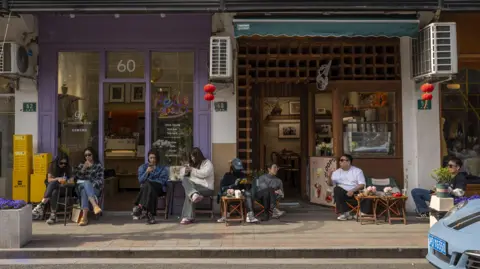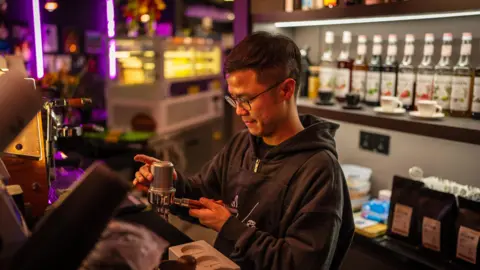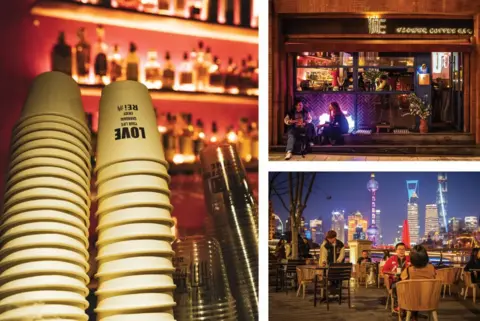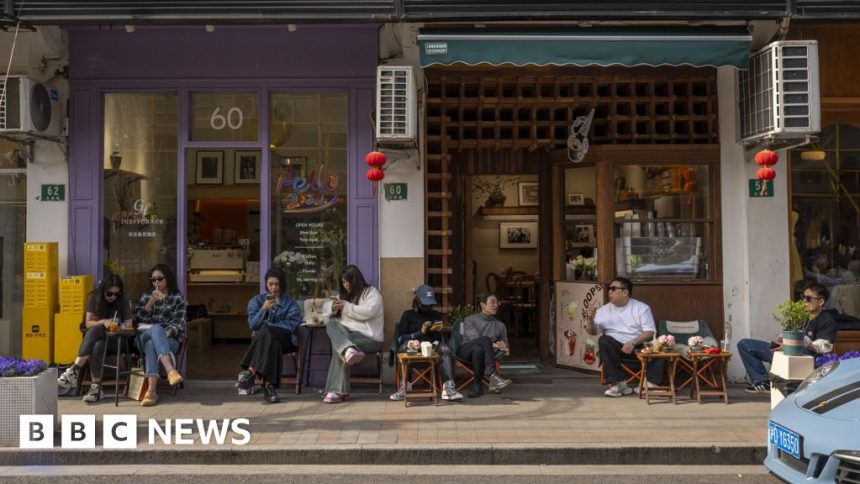City of cafes: Shanghai’s love affair with coffee
 BBC
BBCWalk through the streets of Shanghai and its café culture is unmissable. There are some areas where you won’t be able to turn without passing yet another new little café.
China’s financial capital now has so many coffee shops that the government claims it has the most of any city in the world.
The city’s café culture has been developing for years, but the post-Covid opening up has really given it a boost, as locals embrace outdoor living, looking for places to meet their friends and family.
However, with so many new establishments, the competition for customers has become fierce. Most owners we spoke to don’t think all these businesses can survive.
Shanghai officials say there are “more than 8,000 cafes in the city”. And a report by the Shanghai International Coffee Culture Festival, recorded 9,553 coffee shops at the end of 2023.
And it’s not just the number of outlets that sets Shanghai apart.
Where other Chinese cities are still dominated by big coffee chains like Starbucks and its local rival Luckin, Shanghai’s café explosion is largely fuelled by niche, independent outlets, like Hidden Track.

Its owner Dong Xiaoli says she had “no choice” but to dive head first into the industry because she was so passionate about coffee.
But it hasn’t been easy.
Asked what advice she would give someone considering following in her footsteps, she laughs and replies: “I’d say don’t do it.”
“The investment versus return is awful. You need to buy expensive machines and put a lot of money into decorating. You’re earning very small amounts of money compared to other industries.”
To succeed in this very crowded market, having a distinct vibe has become as important as anything else in attracting customers.
Hidden Track has gone for a limited menu and a simple, minimalist vibe which opens onto the street in a welcoming fashion.

Being seen at a café here is considered hip and urbane, and that has helped drive young customers through the doors. Cafes have become a social occasion with many young people to get dressed up and meet for coffee and a chat.
Shanghai’s residents who have long seen themselves as the inheritors of an outward-looking, cosmopolitan attitude which permeated Shanghai in the early decades of the 20th century, are also proud of their café culture.
“Shanghai has long been an international trading city: we started drinking coffee a long time ago. Smaller cities will also gradually get different types of cafes,” says one man sitting at a café.
A woman nearby agrees that the local café culture is now solidly established. Asked how many cups of coffee she drinks a day, she laughs out loud and replies: “As many as I like.”

And as the cafes increase, so does the appetite for experimentation.
The coffee converts of this tea-drinking giant are keen to try new flavours and new brews.
Yuan Jingfeng, who runs the R1070 café, says all his beans come from Japan.
“My costs are very very high. My imported beans include American and Italian styles which are all imported from Japan in their original packaging,” he says.
“Wholesale prices have gone up dramatically over the past few years. The wars in Yemen and Ethiopia have both had an impact. The good beans are getting fewer while the number of coffee drinkers keeps increasing.”
But, so far, he says he has resisted passing on the increased costs to his growing base of coffee drinkers.
AC café is owned by deaf people and employs deaf baristas.
Yang Yanfang – who interprets at AC for those who can’t speak with their hands – says that, after the pandemic, “friends are really keen to meet up for a coffee or a drink and Shanghai has become a city with a really strong coffee culture.”
“I can skip meals, but I can’t skip my coffee,” she adds.

And this is not the only café of its kind.
Another popular café, which is operated by blind staff, serves coffee through a hole in the wall, from someone wearing a monkey suit arm, to customers waiting in the street.
Along one stretch of road, we counted 18 cafes within only a couple of hundred metres. All of them had plenty of customers inside.
Owners are hoping this will not be just a passing fad.
According to some estimates, China’s coffee market was valued at more than 260 billion yuan (US$35bn) last year. It’s been projected that it could increase by another hundred billion (US$13bn).
The country’s branded coffee shop market grew by 58% last year, according to the World Coffee Portal.

With overheads so high in Shanghai, many coffee shops can’t afford to have their space under-utilised at night. So, when the sun goes down, they are turning their cafes into bars, sometimes with live music.
The owner of the Flower Café and Bar, Wang Xi, has a prime spot with a clear view of the city. His margins are very tight but, at the moment, his venture is surviving.
“I’m a quite optimistic,” he says. “I hope the Chinese economy will quickly return to pre-pandemic levels. If the economy flows again, everyone will make a profit.”
China’s economy may be facing some significant hurdles but, as Wang Xi speaks, he looks out across the customers sitting at little tables and chairs staring down Suzhou Creek towards a gleaming Shanghai skyline and – on this night – it’s hard not to share his optimism.







